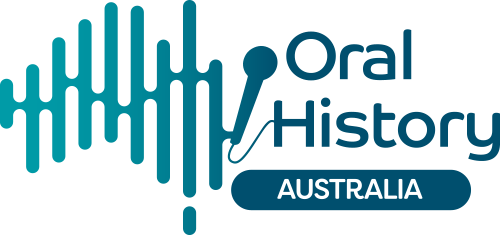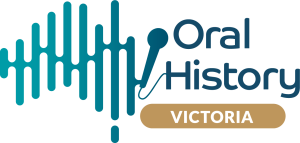Pre-conference workshops
Six half-day workshops will be held on the day preceding the conference, Thursday 21 November 2024. The workshops are open to all, not just conference participants, and cover a wide range of topics.
Registration for the workshops will open mid-June.
Morning workshops (9:30am – 1:00 pm):
- Workshop 1 – Cultural protocols in oral history
- Workshop 2 – ‘Where’s my paddle?’: Managing issues when recording oral history
- Workshop 3 – Multimedia oral history projects: A beginner workshop
Afternoon workshops (2:00pm to 5:30pm):
- Workshop 4 – Indigenous oral history – A roadmap for working with Aboriginal communities: Hanging out, yarning and weaving
- Workshop 5 – Interpreting memories
- Workshop 6 – The rewards and risks of podcasting oral histories
Workshop 1
Cultural protocols in oral history
Australia is home to the world’s oldest continuous culture and has evolved as a multicultural country, comprising people from over 300 different backgrounds. As a pluralist society, the recording of diverse stories and making them accessible is important to educate others. Yet, how do we go about this? What techniques and skills are required to undertake a respectful interview with someone from a different culture? This workshop will be a cultural exchange, with a focus on matters related to interviewing storytellers from varying backgrounds. Ethical considerations and protocols across diverse cultures, including but not only working with First Nations peoples, will be explored. Participants will be given interview briefs and in groups work out ethical and cultural considerations and the appropriate ways to proceed.
Trainer: Elaine Rabbitt lives and works on Yawuru and Djukan Country, Broome WA and is a fourth generation Australian. As an oral historian she has interviewed people from all walks of life and has used these experiences coupled with her theoretical understandings to develop curriculum, present and write on a wide variety of related areas. Elaine, who is the Training Manager at Goolarri Media Enterprises Broome, delivers training locally and nationally and has developed the nationally accredited ‘Oral History Training Course’. For many years she has served as the President of the Broome Historical Society and is currently Vice-President. In 2020 Elaine won the Oral History Australia Media Award. See: https://www.notredame.edu.au/research/institutes-and-initiatives/nulungu/people/elaine-rabbitt.
Workshop 2
‘Where’s my paddle?’: Managing issues when recording oral history
What to do when an interview is up a creek without a paddle? Interviews don’t always go the way we plan. This workshop is like preparing for camping, pack for lots of eventualities and hope for the best of adventures. Together we’ll reflect on how to manage issues when recording oral history like: approaching taboo and sensitive topics, what to do when technology fails, what happens when someone else is in the room, different communication styles and misunderstandings, managing your responses when you like an interviewee too much or not enough, how to handle reticent or wonderful rambling narrators, and how subject positions (such as age, gender, spirituality) might impact the interview. You’ll leave the workshop with your interviewing skills strengthened and your oral history day pack filled with tools including the power of pre-interview chats, consent forms, back-up scripts, and deflationary questions.
Trainer: Dr Nicolette Snowden: Nicolette is an independent historian and researcher. She has undertaken oral history interviews for State Library Victoria, as a consulting historian, and Monash University, focusing on life history interviews and research related to women’s history, natural disasters, labour history, regional and rural experiences. Nicolette is part of the National Library of Australia’s COVID-19 oral history interview team for 2024. Nicolette’s PhD, We live here too: gender, class and ethnicity in an oral history of women in the Latrobe Valley, included oral history interviews to uncover distinct stories about the lives of women in a rural coal-mining community. She also teaches journalism in the university sector and delivers bespoke interview training. Nicolette’s current research work includes recording journalist’s experiences reporting on climate disasters and Australian political cartooning. Connect with Nicolette at LinkedIn: https://www.linkedin.com/in/dr-nicolette-snowden/.
Workshop 3
Multimedia oral history projects: A beginner workshop
Oral history can be used to share experiences and stories from the past in a variety of different multimedia formats including films, online exhibitions, audio documentaries and installations. This provides great accessibility for a wide range of audiences. But undertaking oral history projects with an outcome-focused aim presents its own challenges as well as raising questions about the value of the oral history being captured in such a specific and targeted way. Way Back When historians will share some of their work on a variety of different multimedia projects, talk through the pros and cons, and provide tips and tricks. Through practical, hands-on activities, participants will explore the many ways multimedia formats can be used to showcase and communicate oral history. Participants should bring a laptop with them.
Trainers: Way Back When Consulting Historians is a team of qualified, accredited and award-winning professional historians, committed to representing the past to the public in a meaningful and dynamic way. For twenty years we have been fostering connections to the past that inform and give meaning to people in the present. Collectively we have undertaken over 500 oral history interviews and produced and presented oral history in a wide variety of formats including online exhibitions, audio tours, films, documentaries, digital stories and interactive installations. See: https://www.waybackwhen.com.au/.
Workshop 4
Indigenous oral history – A roadmap for working with Aboriginal communities: Hanging out, yarning and weaving
In this workshop participants will consider the practical aspects of conducting research with Aboriginal communities. We will consider the requirement to work within community relationships, reciprocity and commitments researchers need to make, especially how not to be a fly-in fly-out researcher and how to properly prepare to conduct research with Aboriginal people. Weaving is a cultural medium that Taragara Research uses as the basis for building relationships necessary to undertake culturally appropriate oral history projects. Participants in the workshop will get to experience the creation of this cultural space Online and OnCountry.
Trainers: Taragara Research: The workshop will be presented by Taragara Researchers: Dr Barker will attend in person; Dr Eliza Kent and Michael Brogan will be online and will be joined by Aboriginal Community Researchers/Weavers. Taragara Research collaborates with researchers, research groups, organisations and community on projects that are mutually beneficial for Taragara Researchers and for the Aboriginal communities in which we work. Taragara Researchers work closely with the Taragara Aboriginal Corporation, an Aboriginal led enterprise and cultural broker between the University, government, other non-government entities and funding bodies and the Aboriginal communities in which Taragara Researchers work. Taragara projects are responsive to Aboriginal communities’ aspirations from which research is generated and culturally tailored. See: https://taragara.org/.
Workshop 5
Interpreting memories
How do we make sense of the memories that we record as oral historians? How do we begin to transform stories into histories? In this workshop we’ll consider a range of ways of approaching the interpretation of memories. We’ll note the changing ways that researchers have used memory as a historical source. We’ll consider the factors that shape memory stories. We’ll try out narrative analysis with interview extracts (from Al’s interviews with migrants and war veterans) using the rich clues of sound, gesture, word and narrative form. We’ll think about how we might work with a set of interviews to find historical patterns and illuminate historical themes. You’ll finish up brimming with ideas and enthusiasm for working with your own interviews (or other people’s interviews), armed with lists of further reading if you wish to deepen your understanding.
Trainer: Al Thomson is Emeritus Professor of History at Monash University and has served as President of the International Oral History Association and of Oral History Australia. He has been teaching oral history in both community and academic settings since 1985and in 2018 won the Australian University Award for Teaching Excellence in Humanities and Social Sciences. Al’s oral history books include: Anzac Memories: Living with the Legend (1994), Ten Pound Poms: Australia’s Invisible Migrants (2005), Moving Stories: an intimate history of four women across two countries (2011), Oral History and Photography (2011), The Oral History Reader (2016), and Australian Lives: An Intimate History (2017). He is currently co-editing The Bloomsbury Oral History Handbook. See: https://althomsonoralhistory.com.au/.
Workshop 6
The rewards and risks of podcasting oral histories
Wondering if a podcast can share your oral histories with a bigger audience? In this workshop, you’ll:
- learn different ways to podcast oral history
- hear examples from Australia and overseas
- find out what skills, software and costs are involved
- brainstorm your oral history podcast ideas with others
- leave with a plan, and a podcast playlist to inspire you.
Trainer: Jane Curtis is passionate about history, community stories and skill-sharing. She won Best History podcast for Inner West Icons at the 2023 Australian Podcast Awards, and a 2021 History Council of NSW Award for the ABC radio documentary The Scholar’s Hut. Jane works at UTS Impact Studios making podcasts like Hey History!, an Australian history podcast for kids. All her podcasts use oral histories. See: janecurtis.net.
About the workshops
Date: Thursday 21 November 2024
Time: Morning workshops 9:30am – 1:00pm; afternoon workshops 2:00 – 5:30pm
Venue: Gateway Centre, Trinity College, University of Melbourne. (Find out more about the venue.)
Cost:
- OHA state association member concession (full-time student, pensioner or benefit card holder) – $50
- OHA state association member full price *- $90
- Non-member concession (full-time student, pensioner or benefit card holder) – $70
- Non-member – $130
* Institutions with an OHA state association membership can enrol up to three people for the full member price.
Please note:
These workshops are open to all, whether they have registered for the conference or not. There are six half-day workshops run throughout the day.
Participants can take any combination of up to two workshops, one in the morning and one in the afternoon.
Ticket price includes refreshments (tea, coffee, biscuits and fruit) during a break midway through each workshop. Participants can bring their own lunch or obtain lunch from University of Melbourne outlets which are about a 5-minute walk from the conference venue.
Places are limited, so don’t delay your registration!

